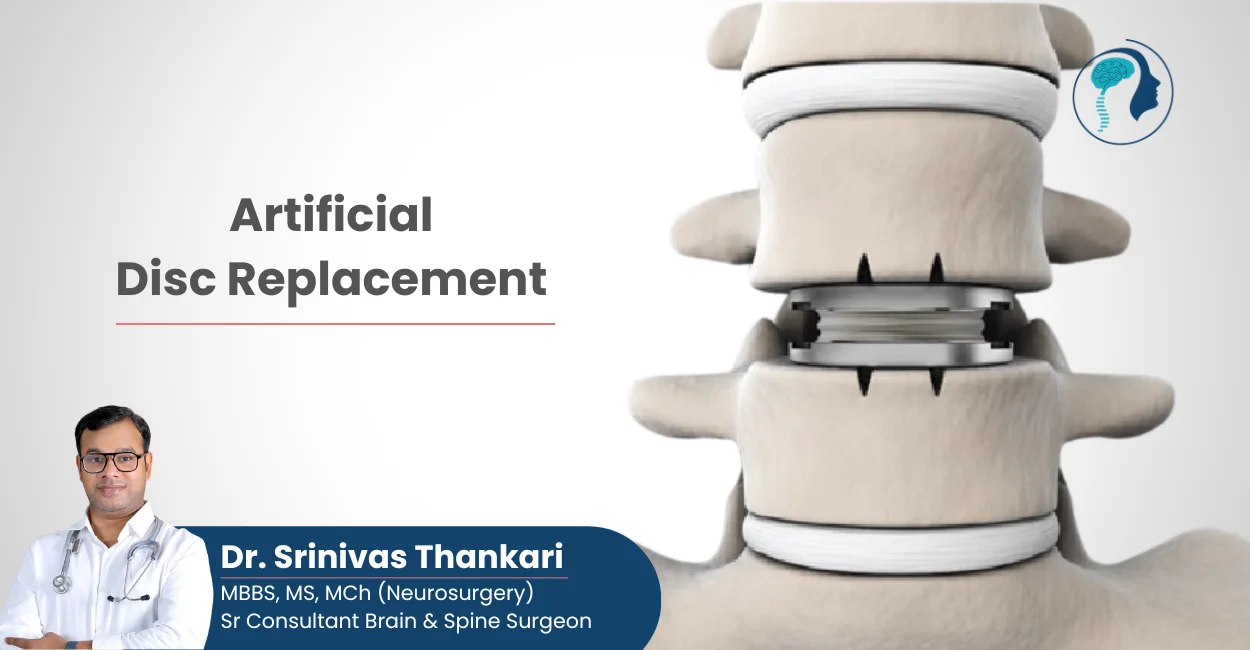
Artificial Disc Replacement by Expert Brain Surgeon | Spine Surgery in Hyderabad
Artificial Disc Replacement is a sophisticated surgical procedure aimed at relieving pain and restoring mobility in patients suffering from degenerative disc disease or other spinal conditions. This procedure involves removing a damaged or herniated disc in the spine and replacing it with a prosthetic disc, which helps maintain the natural motion of the spine.
Indications for Artificial Disc Replacement:
This procedure may be necessary for various conditions, including:
Degenerative Disc Disease: Age-related wear and tear on the spinal discs that can cause chronic pain and reduced mobility.
Herniated Discs: Discs that bulge or rupture, leading to nerve compression and significant discomfort.
Spinal Stenosis: Narrowing of the spinal canal that places pressure on the spinal cord and nerves.
Radiculopathy: Pain or weakness radiating into the arms or legs due to nerve compression in the cervical or lumbar spine.
Benefits:
Dr. Srinivas Thankari, a leading brain and spine surgeon in Uppal, Hyderabad, performs artificial disc replacement to:
Alleviate chronic pain and discomfort associated with damaged discs
Preserve natural spinal motion, improving overall function and mobility
Reduce the need for spinal fusion surgery, which can limit movement
Enhance quality of life by allowing patients to return to their daily activities
Procedure Overview:
The artificial disc replacement procedure typically involves the following steps:
Preparation: A thorough evaluation, including imaging studies such as MRI or CT scans, to assess spinal health and determine the best approach for surgery.
Surgical Technique:The procedure is performed through an incision in the front or back of the neck or lower back, depending on the location of the affected disc. The damaged disc is removed, and the artificial disc is inserted into the disc space to restore height and stability.
Recovery: Patients can often return to light activities within a few weeks, with a rehabilitation program designed to support healing and restore strength.
Diagnosis: Dr. Srinivas utilizes advanced diagnostic tools and techniques to evaluate spinal health, including:
MRI and CT Scans: Imaging studies that provide detailed views of the spine and help identify degenerative changes or disc herniation.
X-rays: Used to assess spinal alignment and detect abnormalities.
Physical Examination: A comprehensive assessment of symptoms and mobility to determine the necessity of surgery.
Post-Operative Care:
After artificial disc replacement, patients receive tailored care, which may include:
Pain Management: Effective strategies to manage discomfort during recovery.
Physical Therapy:Customized rehabilitation programs to restore strength, flexibility, and mobility.
Follow-Up Appointments:Regular check-ups to monitor healing and ensure optimal recovery.
If you are experiencing chronic back or neck pain due to disc issues, consult Dr. Srinivas Thankari, a specialist in spinal surgery. With his expertise in artificial disc replacement, you can achieve lasting relief and regain a healthy, active lifestyle.

